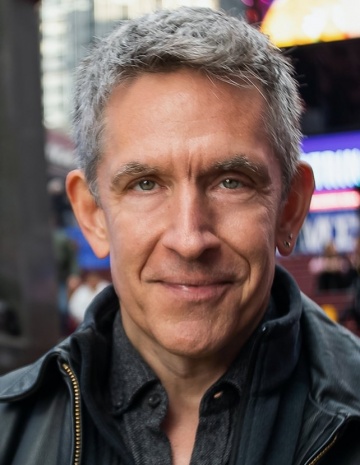Columbia College | Columbia University in the City of New York
A Dorm Lounge Death Scene Launched His Stage Career

What were you like when you arrived at Columbia?
I thought enrolling at the College was the perfect way to get four years of practice of living in New York City before I had to do it on my own. On day one, my father drove me in and the very first thing that happened was that someone broke into our car on 116th Street and stole my little TV.
I could not figure out how to meet people. There were Orientation parties, but I usually find myself at a loss in those situations. Then I saw a notice for auditions for a campus production of Agatha Christie’s Ten Little Indians and I knew that was my way forward. I got in! We performed in the lounge of either Hartley or Livingston; I was the first character killed, and then I had to run the sound for the rest of the show. The people I met doing that play remained my friends throughout my time at Columbia and well beyond.
By my sophomore year, I was already working in an Off-Broadway theater as a stage manager. My entire decades-long Broadway career started in that dormitory lounge with the most spectacular death scene anyone had ever seen.
What do you remember about your first-year living situation?
I was in John Jay before it was renovated. Long before. Eons before. It was, frankly, a dump. I remember standing in it with my family that first day; my sister started sobbing. The only things in it were an old desk with a wooden chair and a mattress on a frame without any legs. There were dirty sneaker prints all over the cracked lime-green walls and even on the ceiling. (I still don’t know how they got up there.) I saw my first cockroach that day. I shoo’ed my horrified family out and went to the hardware store and bought the brightest, whitest paint I could find.
I met my roommate a week later and I don’t think I ever saw him again.
My floor was all jocks … and me. I was the band and theater kid who read a lot of books. I was not a sports person AT ALL. One of the guys who lived down the hall had a room that was filled with towering pot plants and lit with orange grow lamps. I walked past it on the way to the bathroom; it looked like a forest.
I had started dating one of the people I met doing Ten Little Indians and spent most nights sleeping in her Barnard dorm room across the street with her roommate and HER boyfriend. They had both met while acting in the play, too. It wasn’t quite as depraved as it sounds; we did sleep in two separate beds, and we never crossed over. Peter, the director of the play, had graduated some years before and had been sneaking in to sleep in the basement black-box theater below Carman. Then he started sleeping in our room at the foot of the bed. He was a mess, but we worshipped him.
What Core class or experience do you most remember, and why?
Art Hum. We would study an artist like Bruegel, and then I could go downtown and look at one of his paintings in person. When we talked about architecture, I could walk up to a Philip Johnson building and see for myself what he’d done. I could see how his choices had been influenced by the neighborhood. In many ways that class opened my eyes to the world around me and I have greedily been taking it in ever since.
Did you have a favorite spot on campus, and what did you like about it?
I spent many happy times inside the Minor Latham Playhouse at Barnard. We did countless classical plays while I was there, and I developed a love for theater that I still have to this day. Whatever was going on outside on campus, in classes or in life, once we were inside the space, it all just fell away, and we could play.
I have a vivid memory of standing onstage behind the curtain waiting for the show to start. A friend of mine had cobbled together all the scenes involving Margaret from Shakespeare’s history plays. The evening started with me alone onstage. As I was standing there, I realized that I couldn’t remember my first line. I figured it would come to me eventually, but the music started and I still couldn’t think of it. The curtain started rising and still nothing. The lights hit me — and I just stood there. Finally, in the endless silence, I said, “I have no idea what my first line is, we need to start again.”
I’ve been a stage manager ever since!
What, if anything, about your College experience would you do over?
While I might not have learned everything I could have in my classes, I did learn enough to be guided in the right direction. After all these years, I’ve finally read most of the literature that I was assigned. Those classes introduced me to an infinite range of possibilities. College is as much about learning who we are as it is about studying a specific topic. Did I make mistakes? Absolutely, and I wouldn’t change a moment of it.

